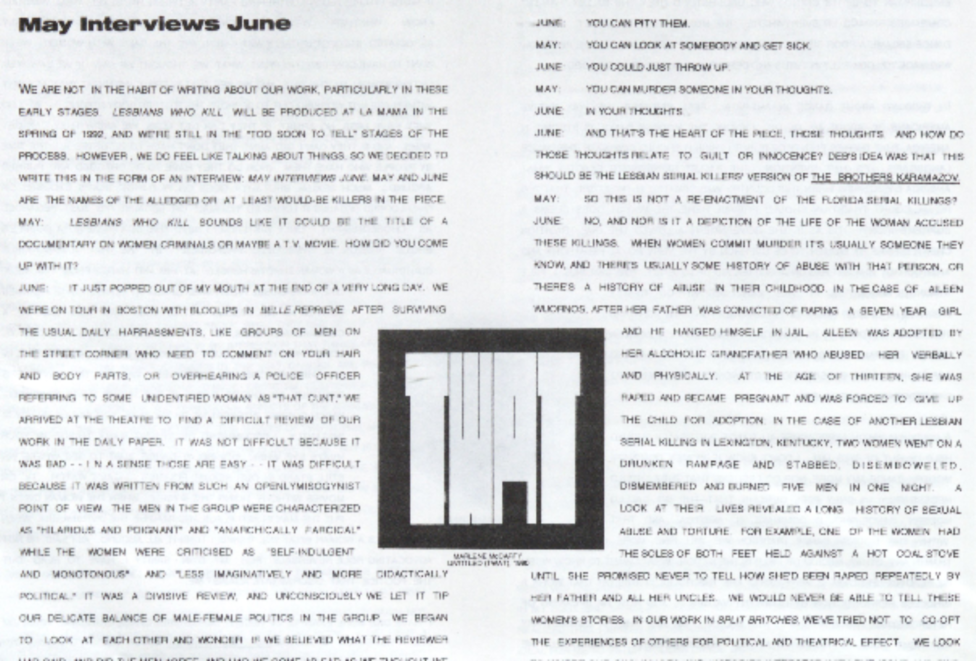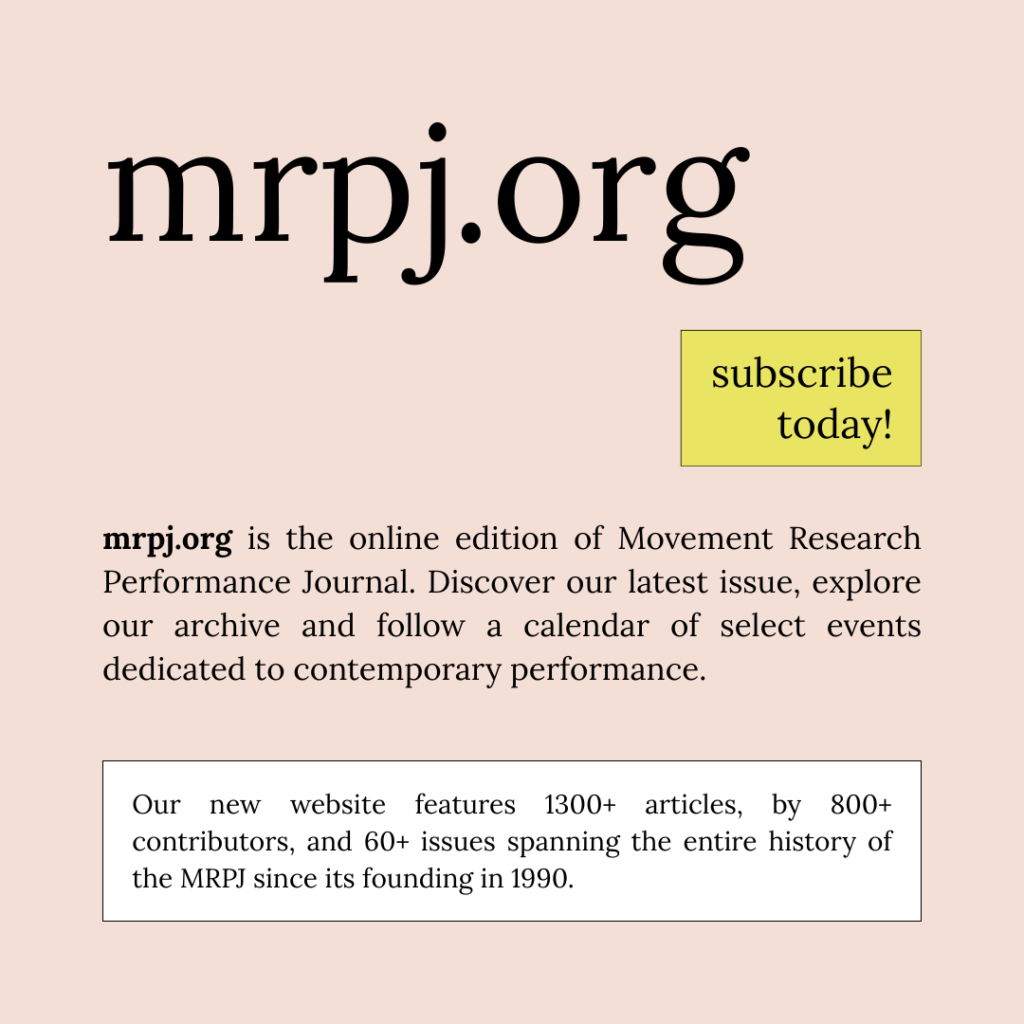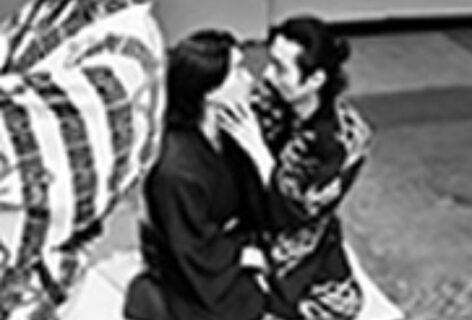MAY interviews JUNE
Conversation between Peggy Shaw and Lois Weaver where they take on the names, “May” and “June”.
We are not in the habit of writing about our work. Particularly in these early stages lesbians who kill will be produced at La Mama in the spring of 1992. And we’re still in the “too soon to tell” stages of the process however, we do feel like talking about things. So we decided to write this in the form of an interview. May interviews June. May and June are the names of the alleged or at least would-be killers in the piece.
MAY: lesbians who kill sounds like it could be the title of a documentary on women criminals or maybe a TV movie, how did you come up with it?
JUNE: It just popped out of my mouth at the end of a very long day. We were on tour in Boston with Bloodies in Belle Reprieve after surviving the usual daily harassments. Like groups of men on the street corner who need to comment on your hair and body parts. Or overhearing a police officer referring to some unidentified woman as “that cunt.’ We arrived at the theatre to find a difficult review of our work in the daily paper. It was not difficult because it was bad – – in a sense those are easy – – it was difficult because it was written from such an openly misogynist point of view. The men in the group were characterized as “hilarious and poignant” and “anarchically farcical” while the women were criticized as “self-indulgent and monotonous” and “less imaginatively and more didactically political” it was a divisive review. And unconsciously we let it tip our delicate balance of male-female politics in the group we began to look at each other and wonder if we believed what the reviewer had said and did the men agree. And had we come as far as we thought we had in our own struggle against sexism? All these issues were too big to talk about on the eve of the last performance of a thirteen-week run and a seven-month process. So after the performance, the women in the company decided to go out for a beer to commiserate the state of our sex in our society we found ourselves in a bar that provided large screen video entertainment for the customers, featuring women being beaten shot and tortured we promptly left the bar only to find that all of our cars had been towed not by the police but by a local towing scam when we protested that a $200 towing charge was too much for parking five minutes in a shopping center parking lot we were reprimanded for not behaving in a “lady-like manner ” it was at this moment that I announced to every man within ear-shot that the title of our next piece was going to be – – lesbians who kill!
MAY: So this was the very first inspiration for the piece?
JUNE: No. In fact just a few days before this fateful day, the third member of Split Britches, Deb Margolin called us with an idea for a new piece that she would write and we would perform. She had been following the case of the “lesbian serial killer”, Aileen Wuornos, who allegedly murdered seven men in Ocala, Florida. We were in London when this news broke. But I remember seeing a headline in a London paper which read “lesbian kills eight men,” and I thought, “what a concept!” so Deb’s idea was that we’d be this lesbian couple who lived a simple if somewhat unusual life somewhere in the south. One day we find ourselves the suspects in the murder of seven men. We are the suspected “lesbian serial killers. ” The fact is we’re innocent. The reality is it could have been us. We could have done it. We had thought about it, even fantasized about it but were we guilty?
MAY: It’s true, you can want to kill somebody.
JUNE: You can pity them.
MAY: You can look at somebody and get sick.
JUNE: You could just throw up.
MAY: You can murder someone in your thoughts.
JUNE: In your thoughts… and that’s the heart of the piece, those thoughts and how do those thoughts relate to guilt or innocence? Deb’s idea was that this should be the lesbian serial killers’ version of the brothers Karamazov
MAY: So this is not a re-enactment of the Florida serial killings?
JUNE: No, and nor is it a depiction of the life of the woman accused of these killings when women commit murder it’s usually someone they know. And there’s usually some history of abuse with that person. Or there’s a history of abuse in their childhood in the case of Aileen Wuornos. After her father was convicted of raping a seven-year girl and he hanged himself in jail, Aileen was adopted by her alcoholic grandfather who abused her verbally and physically at the age of thirteen. She was raped and became pregnant and was forced to give up the child for adoption. In the case of another lesbian serial killing in Lexington, Kentucky, two women went on a drunken rampage and stabbed, disemboweled, dismembered and burned five men in one night. A look at their lives revealed a long history of sexual abuse and torture for example. One of the women had the soles of both feet held against a hot coal stove until she promised never to tell how she’d been raped repeatedly by her father and all her uncles we would never be able to tell these women’s stories in our work in Split Britches. We’ve tried not to co-opt the experiences of others for political and theatrical effect. We look to where our own images and histories intersect with the issue and find our own impulses in that intersection in other words. Looking for our own desire and impulse to kill that comes from our own images of abuse in our daily lives. I guess we’re looking for that moment where we all connect as the killer rather than the killed. I think a lot about that moment in Marleen Gorra’s film A Question of Silence when three different women from three different class and life experiences descend spontaneously on a shopkeeper and murder him. There’s no logical explanation but we know why we are complicit, that’s the moment we’re looking for. Our moment of complicity.
MAY: Do you have an example?
JUNE: Like the night I was walking down second avenue and a skyway plumbing truck cruised by for a third time with their comments about “eating our pussy” or about our going home to “eat each other’s pussy “. It was a business van with a business number printed on the side. I called the number and informed the dispatcher that I knew the name and address of these drivers, and if they persisted in insulting women on the street, I would show up at their home and murder them and their entire families. I meant it.
MAY: Does this mean that this is a piece that advocates violence towards men?
JUNE: Advocating violence? I guess it advocates images of violent women or women expressing violence. We’re usually afraid and embarrassed for women criminals. For in the end they seem to do little harm. I want to see women who can do some harm. I’d like to be dangerous. A potential threat and it doesn’t take too much to cross that line for example. To continue with the skyway plumbing story, after I made the call, the van did cruise by for a fourth time and they did continue their verbal abuse. So this time I responded with a phrase that contained the words “mother” and “fucker”–that was it. The van screeched to a halt and two men got out armed with car antennae saying we had gone too far. We had called them “motherfuckers.” We had crossed over that line. We were dangerous. I’ve often thought that if all women started registering guns, we’d soon have a gun control law.
MAY: But still, doesn’t this seem to be aimed towards men?
JUNE: You mean do I hate men? No why should I hate men? As a lesbian, I don’t really have to hate them because I don’t have to relate to them. “Man-hating lesbian.” It’s a way of dismissing our arguments against the imbalance of power in this society. Then we spend all our time disclaiming “it’s not that we hate men. It’s just that… ” or ” of course we don’t hate all men.” Aileen Wuornos has had to repeatedly state that she was not a man-hater, she’s just accused of killing them. We rarely hear the rapist worried about being called a women-hater. I’m talking about violence as a response to misogyny. How many women have said to me recently that they were thinking of carrying a gun? They’re not just talking about safety or physical self-defense. It’s about frustration. It’s like what happens in an improvisation class when you’re stuck. You run out of resources and you turn to death. Someone either kills or gets killed. I think that accounts for the mood of violence among women. We’ve come to the end of a long and tiring improvisation and we’ve run out of ideas the only thing for sure is that we’re not going to lay down and die. And if we have to, we’ll kill rather than get killed. Sounds angry doesn’t it?
MAY: Actually that brings up my next question. Split Britches is known for its comedy, where is the humor in this?
JUNE: The title is funny, people laugh. Although men are sometimes threatened. That makes me think of issues of prerogative in humor, take the dirty joke. For instance when spider woman made use of the dirty joke in their first piece in 1975, women in violence, people were repulsed by the idea that women could be vulgar or offensive and shocked by the idea that feminists could have a sense of humor. Drag is another male domain. It’s always funny when men dress up and portray women. And often it’s commercially successful. Like in the case of Charles Busch’s vampire lesbians of Sodom. That was twice as funny because it was a man portraying not just a woman but also a lesbian. Female drag is acceptable and hilarious even among straight performers and audiences but let a woman don the clothes of the power-brokers themselves and suddenly it’s no longer funny, it’s “self-indulgent and monotonous ” and in lesbians who kill we’ll be dealing with vulgarity. Drag and violence! God help us! Nevertheless we believe in humor. We like to walk that line between tragedy and comedy, and in this case we hope to walk a line between what’s frightening and what’s funny. The fear will lie in the content, the humor will lie in the style and the timing.
MAY: You mentioned style. Is there anything about this new piece that might be different from your other work?
JUNE: Split Britches has always felt that our work, and a lot of other women’s work, is different from traditional theatre. Or “men’s theatre’ as we call it, because we do not rely on plot or linear narrative. There is very seldom an event or climax around which a story is woven. It is primarily a theatre of relationships; women’s relationships to each other, to their environment, to their moments, to their teacups. There’s no necessity for war or rape or murder to drive the action so I guess the difference in this piece is that we are using murder. But we’re using it for content rather than form.
MAY: Any characteristics about the piece so far that you’d like to share?
JUNE: Lets see. The piece takes place in the front seat of a car during a thunderstorm
JUNE: We live in a house that attracts lightning. And every time it storms, May makes us sit in the car.
MAY: June likes to take long trips.
JUNE: It’s because of the tires she says. They keep us from getting hit. One time she said she saw a ball of lightning roll into the house. Roll around the top of the stove, the sink, the kitchen cabinet looking for somewhere to land, looking for us now. We’re smart. We sit in the car.
JUNE: And right now the piece ends with a lip-sync gun number done to a recording of the Bobbettes singing “I shot Mr. Lee”
MAY: One more question, have you seen Thelma and Louise?
JUNE: Not yet. We’re holding off until we have a better sense of what lesbians who kill will be like. It’s funny you should ask. Though I have a friend who says that now when men harass her on the street, she walks up to them and says ominously, “Have you seen Thelma and Louise?”
Peggy Shaw + Lois Weaver






